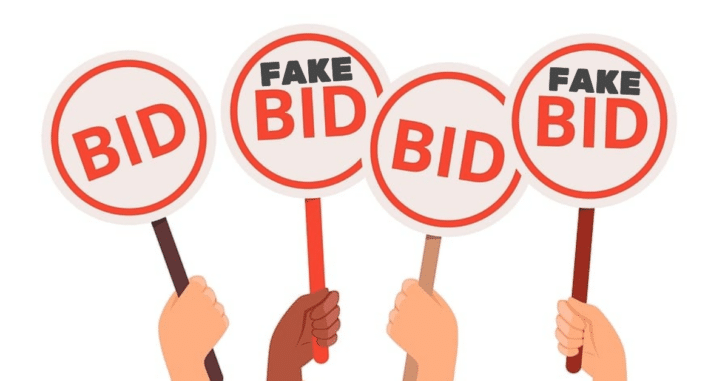Bidders are right to be upset, but solutions can be controversial, too.

There’s been some discussion about gaming expired domain auctions lately, including a good back-and-forth on NamePros.
The instant concern is people gaming auctions by setting up two bidders for the auction. These two bidders quickly bid up the price, and when the top bidder doesn’t pay, the second bidder gets the domain for whatever price he would have paid had the top bidder not bid in the auction. The auction house rolls back the bidding to pretend that the top bidder wasn’t there. Since both bidders are the same, the bidder gets the domain while pushing out all other bidders through the fast price escalation.
This is how GoDaddy handles non-paying bidders.
People are frustrated. But what’s the alternative?
Just a few weeks ago, a domain investor complained to Namecheap about how it handles (handled) non-paying bidders. In that case, the investor was the second-highest bidder, and the top bidder didn’t pay. The investor said he was required to buy the domain at his second-highest bid.
Namecheap CEO Richard Kirkendall told the investor that he was not required to pay the second-highest bid. If he didn’t pay, the domain would be relisted. This option probably wasn’t clear.
But after some discussion, Kirkendall reported a change: the second highest bidder will no longer be given the option to buy the domain. The auction will be restarted instead.
This seems like a reasonable option, although I know it can be difficult for marketplaces selling expired domains to do this. These systems are automated, and relisting a domain requires a bit of manual involvement or recoding to handle a domain that’s about to expire. The auction house would probably need to renew the domain itself. It might seem simple, but it could get complicated when dealing with third-party registrar inventory.
Kirkendall said another change is in the works. Namecheap will begin running credit card authorizations for bidders as they bid in auctions.
This is what Sav.com did a long time ago. Since sellers can list any domain on Sav, people rightfully complained that sellers were pumping up prices. If no one took the bait to bid higher, they simply relisted the domain.
So Sav.com introduced credit card pre-authorizations for bidding increments. It restored trust in bidding at Sav.com.
This might inconvenience legitimate bidders, but it certainly cleans things up.
But is the problem as big as people think?
Writing on NamePros, NameBio’s Michael Sumner said he believes these bidding improprieties impact about 1 in 1,000 auctions with bids. So perhaps it’s not so common. Granted, it happens with higher-priced auctions, which makes it more visible.
At the end of the day, the most important thing is how it looks to bidders. If they don’t trust the auction platform, they’ll stop bidding.






I have domains at NameCheap.
How come I cannot submit my domains to the auction in NameCheap….is it because NameCheap does not have their own auction platform.
“So perhaps it’s not so common. Granted, it happens with higher-priced auctions, which makes it more visible.”
No one is doing it to get a $100 domain for $30.
They are only doing it when they can make a lot of money.
Here are some example rollbacks.
26x․com from $4,444 to $550
oAir․com from $9,088 to $15
6v․net from $8,100 to $15
8y․net from $7,500 to $520
6y․net from $7,200 to $15
NDTC․com from $3,800 to $45
GBQP․com from $4,750 to $60
2006․com from $91,000 to $20,250
2875․com from $31,399 to $8,100
994488․com from $4,850 to $128
TD7․com from $4,000 to $15
ZS8․com from $6,600 to $1,100
588888․com from $34,500 to $45
TWCI․com from $3,250 to $265
883․cc from $55,500 to $15,050
OHTY․com from $3,000 to $62
F6․net from $9,088 to $32
Head over to GoDaddy auctions and look at the current top results. You can see the scheme in action now, as a couple bidders push auctions far past any rational number in a matter of minutes.
It blocks any legitimate bidders from bidding on the most desirable domains.
Brad
Why can’t they do like what ebay is doing?
Show us the auction id and cross check how many auctions they are involved in.
Have a valid credit card!!
I think adding the credit card requirement is a good start … it won’t solve the problem at least it’s a serious effort. This is something that should be considered for marketplaces as well. Too many BIN’s that we wait sometime weeks to pay the bill who just ghost it … resulting in no sale and the domain being off the market all that time. Credit cards should be added and if someone does a buy it now a % of the sale should be charged. If the sale completes as expected that deposit is applied to BIN … if not then the ghost buyer loses the deposit unless they have a legit reason that justifies backing out. That would pretty much end the BS BIN’s … no one just playing games is going to want to lose their deposit. That or some similar thing is a must … the marketplaces impose no consequences for buyers who ghost their BIN sale … which is an agreement to purchase. Why is no one talking about dealing with this problem as well?
Couldn’t you just see who’s ending up with the domains?
I know they are on privacy but with a little research…
In .br drop auctions are restarted with the remaining contestants if the winning bid doesn’t pay. It takes some manual labor, because the other bidders are screened to see whether they are related to not paid winning bid, but works better than the alternatives.